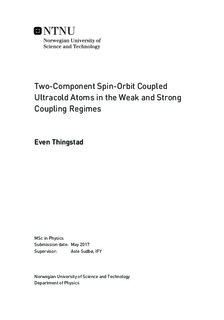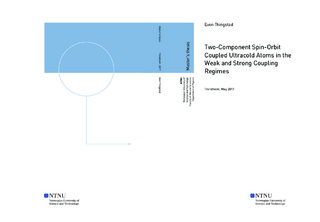| dc.description.abstract | Motivated by recent experimental advances, we study two-component spin-orbit coupled ultracold bosonic atoms in two dimensions on a square optical lattice. Using a Bose-Hubbard model with spin-conserving and non-spin-conserving nearest neighbour hoppings and spin-dependent on-site density-density interaction, our goal is to characterize phase separation and spin structure in the weakly interacting and deep Mott regimes.
For the weakly coupled regime, we decouple interactions through a real space uniform density mean field theory. At zero temperature, this gives an analytic condition for the phase separation transition driven by inter- relative to intracomponent interaction. Solving the self-consistent equations at finite temperature reveals entropic remixing in the phase separated regime and a more surprising entropy driven phase separation in the mixed regime. This is a consequence of complex interplay between interaction and spin-orbit coupling, and can be explained through the effect of component imbalance on the effective single-particle dispersion relation. We also provide an alternate explanation based on thermal occupation of eigenstates with a characteristic imbalance.
In the strongly interacting Mott regime, we derive an effective spin Hamiltonian describing the magnetic phases of the Mott insulator. The competition between anisotropic {Heisenberg} and Dzyaloshinskii-Moriya interactions gives rise to various ferromagnetic, antiferromagnetic, spiral, stripe, vortex, and skyrmion phases. On basis of classical Monte-Carlo simulations in the literature, we reconstruct the phase diagram with a classical variational approach, while magnon excitation spectra and quantum fluctuations are calculated with Holstein-Primakoff transformation and subsequent spin wave expansion. The analysis shows that states with ferromagnetic or antiferromagnetic ordering of boson species are protected against thermal fluctuations by a gap, and well described by classical states. States with equal superposition of boson species at each lattice site are subject to relatively large quantum fluctuations, which may cause breakdown of the states within their classical parameter space regions. The dispersion relations are gapless and linear around the minima to lowest order in the spin wave expansion. | |

